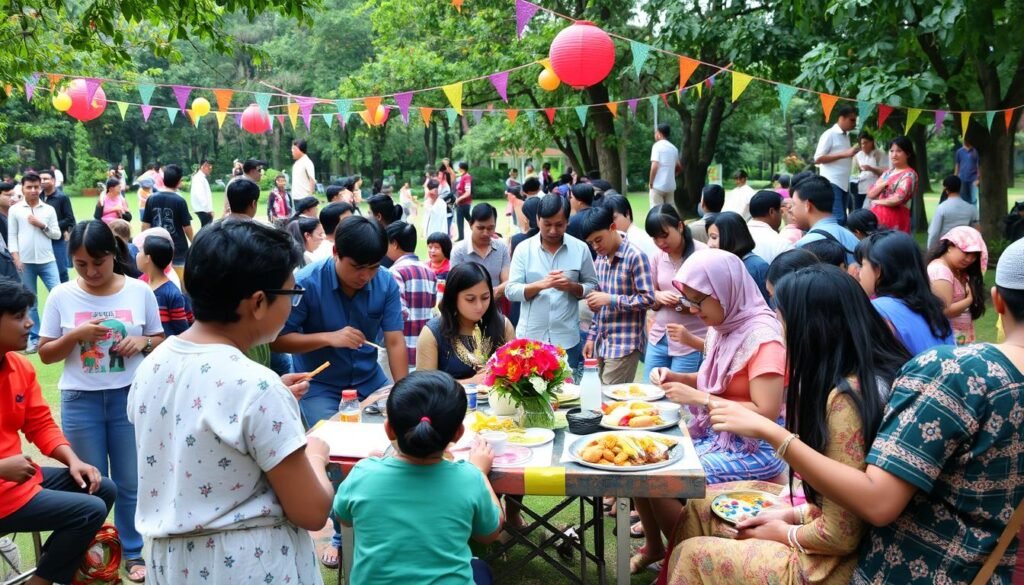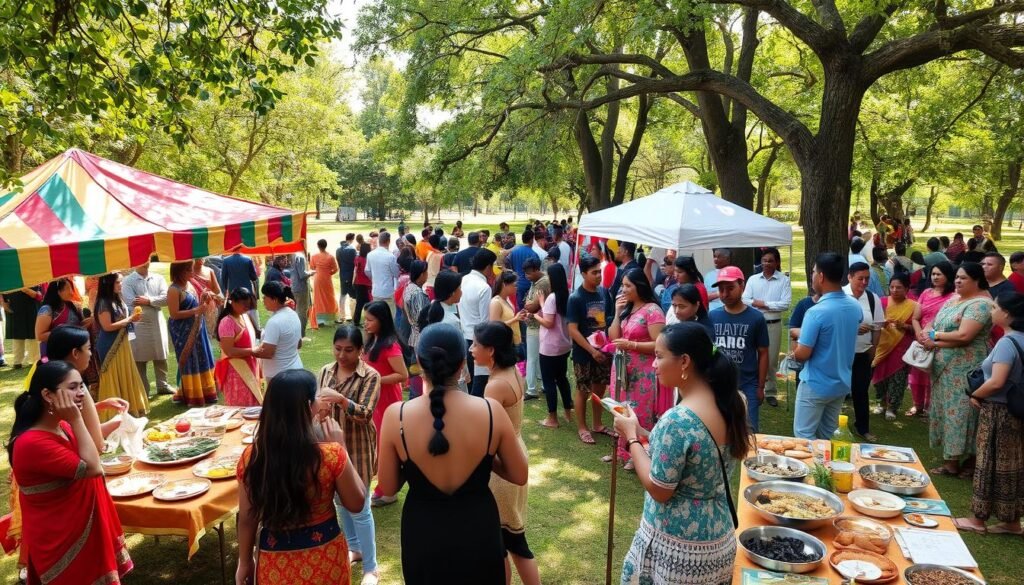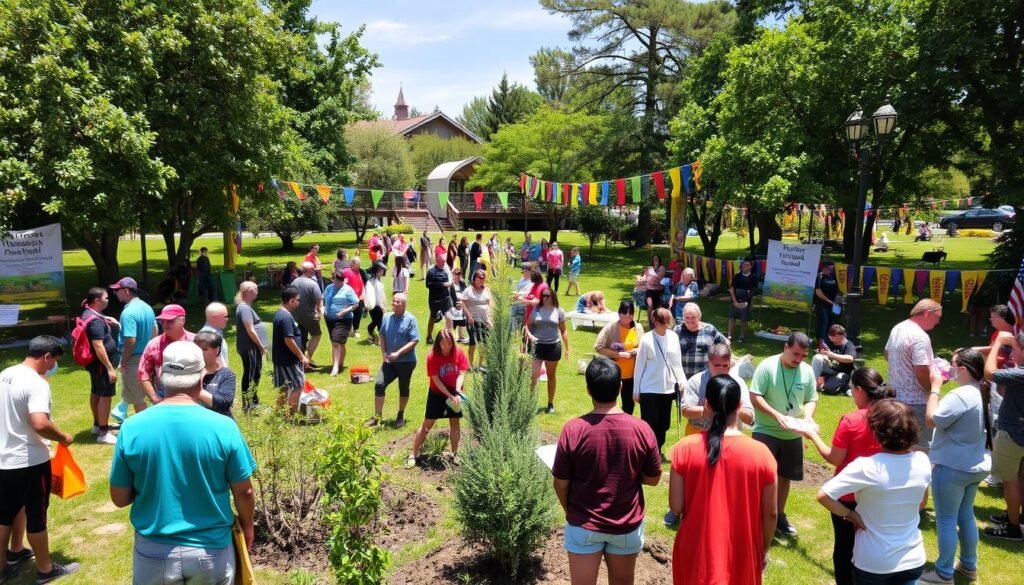Did you know that volunteering can lead to a longer life? This finding highlights how vital community involvement is for both physical health and mental well-being. Taking part in community events can help lessen anxiety. It lets people make meaningful connections and share experiences.
Studies show joining such activities can fight off loneliness and isolation, which often cause anxiety. Community events create a supportive space. They make socializing easier, which improves mental health and overall happiness.
Key Takeaways
- Volunteering is associated with lower mortality rates, showcasing its health benefits.
- Community participation can reduce feelings of isolation and enhance mental health.
- Engaging in community events fosters new friendships and strengthens existing relationships.
- Individuals who volunteer often experience a boost in self-esteem and a sense of purpose.
- Participation in community activities is crucial for personal growth and development.
Understanding Anxiety and Its Impact on Daily Life
Anxiety affects millions in the US. It shows up in different ways, like generalized anxiety, social anxiety, and panic attacks. Each type brings its own set of challenges, affecting people’s lives greatly.
People with generalized anxiety disorder (GAD) worry non-stop. This worry makes focusing hard and affects daily life. They may feel restless, have trouble sleeping, and get irritated easily. These symptoms can hurt work and personal life, making someone feel alone. Panic attacks from panic disorder can make socializing hard because of symptoms like a fast heartbeat and chest pain.
Social anxiety disorder makes social situations scary. People may blush, sweat, or avoid looking others in the eye. This intense fear can stop them from making friends and feel more isolated.
There are other anxiety disorders like agoraphobia and selective mutism. Agoraphobia causes a fear of open or crowded places. Selective mutism makes talking in certain situations hard. Both can limit someone’s ability to do everyday things and socialize.
Being part of a community can help fight these issues. It offers support and a chance to make friends. This can reduce anxiety symptoms and improve mental health. A strong community offers understanding and friendship, making daily life better.
| Anxiety Disorder | Common Symptoms | Potential Impact on Daily Life |
|---|---|---|
| Generalized Anxiety Disorder | Restlessness, irritability, sleep problems | Difficulty concentrating, emotional distress |
| Panic Disorder | Heart palpitations, chest pain | Avoidance of certain situations, fear of panic attacks |
| Social Anxiety Disorder | Self-consciousness, difficulty making eye contact | Avoidance of social events, isolation |
| Agoraphobia | Intense fear of public spaces | Avoidance of situations outside the home |
| Selective Mutism | Inability to speak in certain social situations | Limited communication, isolation |
The Role of Community in Mental Well-Being
Being part of a community greatly improves mental health. People often feel alone and isolated, especially when facing mental health issues. A strong sense of community can reduce these feelings by providing support and creating connections. This helps people who are searching for a place where they fit in.
Studies show that people with a good community network are happier and more satisfied with life. Communities play a key role because they bring together people with similar interests. For example, doing volunteer work can help form strong social ties and give a sense of purpose.
Feeling valued in a community can boost self-esteem, give validation, and offer safety. All these are crucial for good mental health. Experts agree that being connected with others is a basic human need that significantly affects mental health.
In the Myaamia community, educational programs greatly increased people’s sense of belonging. Before these programs, only 25% felt a strong connection to their community. Afterward, this number soared to over 96%.
Going to community events helps form support networks. Meeting new people can strengthen community bonds. Talking openly about mental health challenges acceptance and reduces stigma. This builds empathy and unity, which is great for mental well-being.
| Community Aspects | Impact on Mental Well-Being |
|---|---|
| Sense of Belonging | Reduces feelings of loneliness |
| Social Support Systems | Provides emotional regulation and resilience |
| Shared Values and Experiences | Enhances self-worth and validation |
| Engagement in Activities | Fosters purpose and connection |
| Open Conversations | Promotes acceptance and understanding |
In summary, being involved in a community is key to better mental health. It builds social connections, provides support, and gives a sense of belonging. These are all important when dealing with emotional challenges.
Benefits of Participating in Community Events
Getting involved in community events offers many great benefits. It helps make friends and feel less alone. By joining local events, people meet others with the same interests. This helps build strong friendships and a network for emotional support.
Creating Social Connections
Community events are perfect for making social connections. Activities like festivals and farmers’ markets let you meet like-minded people. These new friendships can offer support in tough times. Such connections improve mental health and happiness.
Reducing Feelings of Isolation
Community events play a big role in fighting loneliness. Being active in your community helps you feel like you belong. Volunteering or going to local events helps reduce isolation. This keeps depression at bay. People who often volunteer feel better about themselves and lead happier lives.
How Community Events Foster Social Connections
Community events are key for making friends and connecting with others. These gatherings allow people from all walks of life to meet. Events like volunteering or enjoying festivals help create a welcoming space for everyone.
Building New Relationships
Attending cultural events can lead to new friendships. People bond over shared community activities. This helps everyone find something in common, making it easier to chat and connect. Fostering social connections during these times is vital. Getting involved brings lasting social benefits.
Strengthening Existing Ties
Being a regular at community events strengthens old friendships. These events bring people back together, helping deepen their ties. They create a welcoming environment, nurturing trust and understanding among everyone. Events like festivals and charity drives spark community pride, keeping everyone connected and involved.

The Therapeutic Benefits of Volunteering
Volunteering has big therapeutic benefits. It can change someone’s emotions for the better. By helping in the community, people find new sides to their emotional health.
Doing kind acts helps make connections. It also gives a sense of purpose. This is key for good emotional health.
Enhancing Emotional Health
People who volunteer often feel happier. They also have less anxiety and depression. Helping others makes everyone involved feel better.
Research shows volunteers have lower stress. They also feel more fulfilled. Being active in the community is good for you.
Increasing Self-Esteem and Self-Worth
Volunteering boosts self-esteem and self-worth. Helping out gives people a sense of achievement. This makes them feel valuable.
This leads to more happiness and less loneliness. Volunteers have strong social networks. These networks help their mental health.
Cultural Exchange and Personal Growth
Engaging in cultural exchange leads to new experiences and fresh ideas essential for personal growth. Since the 1960s, cultural exchange programs have grown, making them available to a global audience. Taking part in these programs allows individuals to see different ways of life and understand various cultures better.
Broadened Perspectives and Understanding
Joining cultural exchange programs helps people learn and understand more. Organizations, including schools and government bodies like the U.S. Bureau of Educational and Cultural Affairs, offer these opportunities. For students, it means studying abroad to develop empathy and better intercultural understanding.
Volunteering in cultural exchange lets people help out and learn about local traditions. Professionals share knowledge in fields such as technology and arts. This improves understanding of worldwide challenges and boosts skills like communication and listening.
Virtual cultural exchange is a newer option that is more affordable. It uses video calls and web chats for global interaction, building a worldwide community. These adaptable programs mean growth can happen without traveling, through talks and projects.

Cultural exchange helps us grow by making us question our beliefs and value diversity. Those who join these programs see the world differently and form deeper connections with people. It supports a lifetime of learning and growing.
Local Impact: How Community Events Strengthen Neighborhoods
Community events are key to building strong neighborhoods. They bring people together around shared goals. This unity helps tackle local challenges and celebrates culture. When people join in these activities, they boost community bonds and pride.
Getting involved helps residents understand each other and local officials better. This is vital for shaping services that meet community needs. Working with local governments leads to fairer decisions. It makes neighborhoods better places to live.
By including everyone, community events make sure all voices are heard. Actions like donation drives, yoga, and cleanups bring change. Events like the DeKalb Corn Fest, drawing over 100,000 people, show the power of community efforts. They also support small businesses.
Community events also let people gain new skills and promote health. Projects like Community Garden Days and cleanups beautify areas and bring neighbors closer. These activities make communities vibrant and welcoming.
In conclusion, community events are critical for neighborhood strength. They foster connections, empower individuals, and improve community health. Participating in these events makes a big difference locally.
Exploring Diverse Volunteering Opportunities
Volunteering is a great way to get involved in your community. Many groups need help, from animal shelters to food banks. It’s a chance to make a difference and grow personally.
Looking for volunteer work helps build social ties and a sense of community. Programs like mentorship can greatly aid diversity and inclusion. They support people from marginalized communities, changing lives and broadening views.

Language and cultural exchanges bring different people together. These programs fight stereotypes and promote understanding. They boost community involvement. Volunteers also push for policy changes through advocacy, making society fairer.
Helping in schools and colleges enhances diversity and inclusion. Volunteers aid learning through tutoring and workshops. Taking part in community clean-ups and cultural events unites and uplifts neighborhoods.
Studies show nonprofits in medium-sized cities can lower crime rates. Volunteers giving 100+ hours a year are very healthy. Projects like Catchafire reveal many volunteers keep on giving, with some becoming board members. This ongoing dedication shows volunteering’s big impact on both communities and individual health.
For more on volunteering’s personal rewards, check this in-depth article.
Fostering Civic Pride Through Engagement
Fostering civic pride is key to improving community life. Being active in local efforts creates a feeling of belonging. It also teaches us to care for our society. When we join community events, we help make our surroundings lively. This makes people happier with where they live. It also encourages them to do good locally.
Being part of civic life is important for democracy. It makes sure people’s voices are heard in big decisions. This leads to better services and results. Communities focusing on social duty often enjoy a higher quality of life. They also solve tough problems well. For example, in Vallejo, letting residents help decide on budget matters makes them feel powerful.
Community activities bring people together, fighting loneliness. In Austin, cleaning up the city not only makes it look better but also raises community pride. Working together and being open builds trust between people and the government. This trust strengthens community bonds.
Making community engagement a part of daily life builds a common aim for the future. It creates a strong sense of duty that lifts everyone up. People care more about where they live. They volunteer more and take part more in civic matters.
Conclusion
Joining community events can really ease anxiety and boost mental health. Engaging with others helps build social connections and make everyone feel included. This support network is key to not feeling alone and improving life quality.
These events let people see different views, which helps them grow. The importance of being part of a is huge. It makes communities stronger and everyone in them feel like they belong.
This sense of belonging is really good for our mental health. Also, being socially active, like at community happenings, is known to lessen anxiety. Laughter and sharing moments with others at these events can heal and bring happiness. It shows that being part of something can help with anxiety.